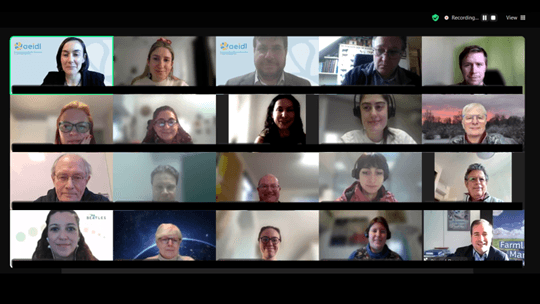On the back of the Political Guidelines for the next European Commission 2024-2029, the final report of the Strategic Dialogue for the Future of Agriculture and the upcoming Vision for Agriculture and Food expected by the end of February, AEIDL organised on 13 January 2025 the second EU multi-actor working group workshop aiming to co-design solutions and EU policy recommendations to expand Climate-Smart Agriculture (CSA) towards 2030 and 2040.
The session was designed within the BEATLES Horizon Europe project to gather a diverse group of experts from various disciplines linked to Climate-Smart Agriculture in order to develop solutions to the proposed challenges by harnessing their collective intelligence and brainstorming.
A group of 40 participants from 19 different countries was selected to engage in collaborative problem-solving, allowing for 10 groups to work simultaneously on two critical challenge statements following a policy hackathon methodology. The first challenge focused on exploring ways to support farmers at the farm level in adopting and implementing climate-smart agricultural practices effectively. The second challenge aimed at finding strategies to assist policymakers in designing and implementing public policies that promote CSA. Firstly, the groups compiled their collective knowledge, sharing insights into previous efforts, initiatives, and actions they were familiar with. Groups then formulated solutions ensuring they could be realistically implemented by 2030 and/or 2040.
The session included two presentations that showcased the project’s current research findings. Marilena Gemtou from the Agricultural University of Athens discussed farmer segmentation, while Blanca Casares from AEIDL addressed the implications of adopting Climate-Smart Agriculture (CSA) practices within the CAP Strategic Plans framework, focusing on the five Use Cases.
Additionally, Ricard Ramon i Sumoy from the European Commission Directorate-General for Agriculture and Rural Development (DG AGRI) provided key insights into the EU agricultural policy landscape, offering a vision and preparation for the new Common Agricultural Policy (CAP). He remarked that 2024 was a special year that resulted in a reform of the PAC to address the concerns of the sector towards more simplification. This was followed up with the Strategic Dialogue on the Future of EU Agriculture leading to a series of ideas for the future of the PAC. The Commission is presently studying in preparation for the Vision for Agriculture and Food due later in February 2025.
He highlighted that this Vision would serve as a roadmap for the coming years, including the future CAP, which is to be proposed by the end of 2025. The new CAP will be built on three pillars: Competitiveness, Sustainability, and Resilience, with a needs-based distribution of resources.
Some of the issues being considered is a rethink how to compensate those who voluntarily comply with agricultural conditions beyond the mandatory requirements. Additionally, he spoke about rethinking farm income objectives to segregate from broader goals, such as environmental sustainability. While the aim is that of a more performance-oriented policy the challenges and limitations in measuring results need to be addressed.
He took the opportunity to disseminate the study titled Rough estimate of the climate change mitigation potential of the CAP Strategic Plans (EU-18) over the 2023-2027 period published on November 2024 financed by the European Commission, was carried out by the European Evaluation Helpdesk. The workshop ended with a plenary session in which the groups presented their results, emphasising the need for policy coherence, enhancing the result-based approach by drawing lessons from existing environmental models and adapting them to climate initiatives. They also called for the inclusion of Nature-based solutions under eligible practices, better measurement of the sustainability impacts of technologies, and a stronger role for advisors and AKIS. Other suggestions included the development of long-term schemes. For that it would be need to rethink the requirements for Member States to design eco-schemes for multiple years and providing supplementary payments to beneficiaries making multi-annual commitments. In addition, individual farm assessments are needed to better understand the needs of small farmers when designing CAP subsidies. Some of the suggested solutions centered on raising awareness about the essential role of producers and the agricultural sector, upskilling and continuous professional development of various stakeholders in the supply chain. They also emphasised the importance of agricultural research into technical studies, the provision of support for young people, and the better alignment between consumers and farmers.
Visit the event’s website and have a look to presentations, recordings and the Highlight Report, here.
AEIDL is forming an EU multi-actor group with experience in CSA or related topics, as well as specific experience in policy design, implementation, monitoring and/or evaluation linked to agriculture and food. Do you want to be part? > Contact Blanca Casares (bca@aeidl.eu)


